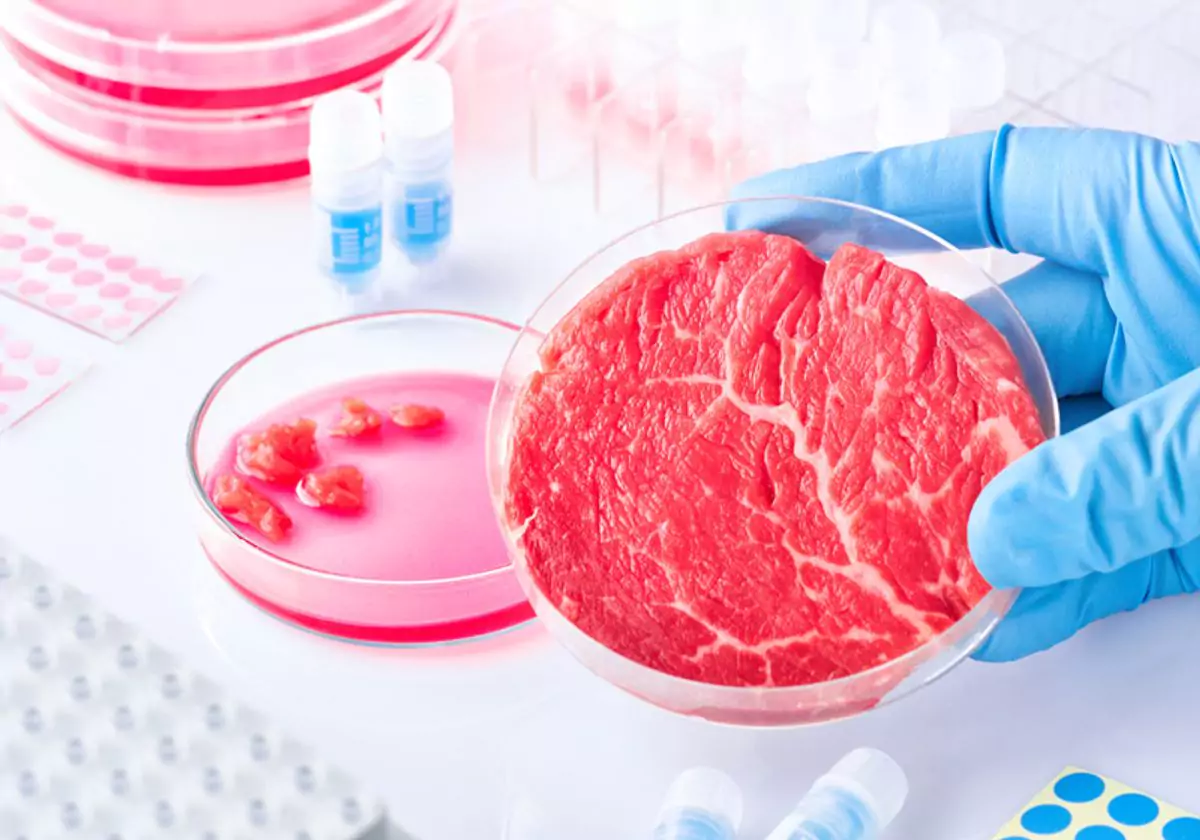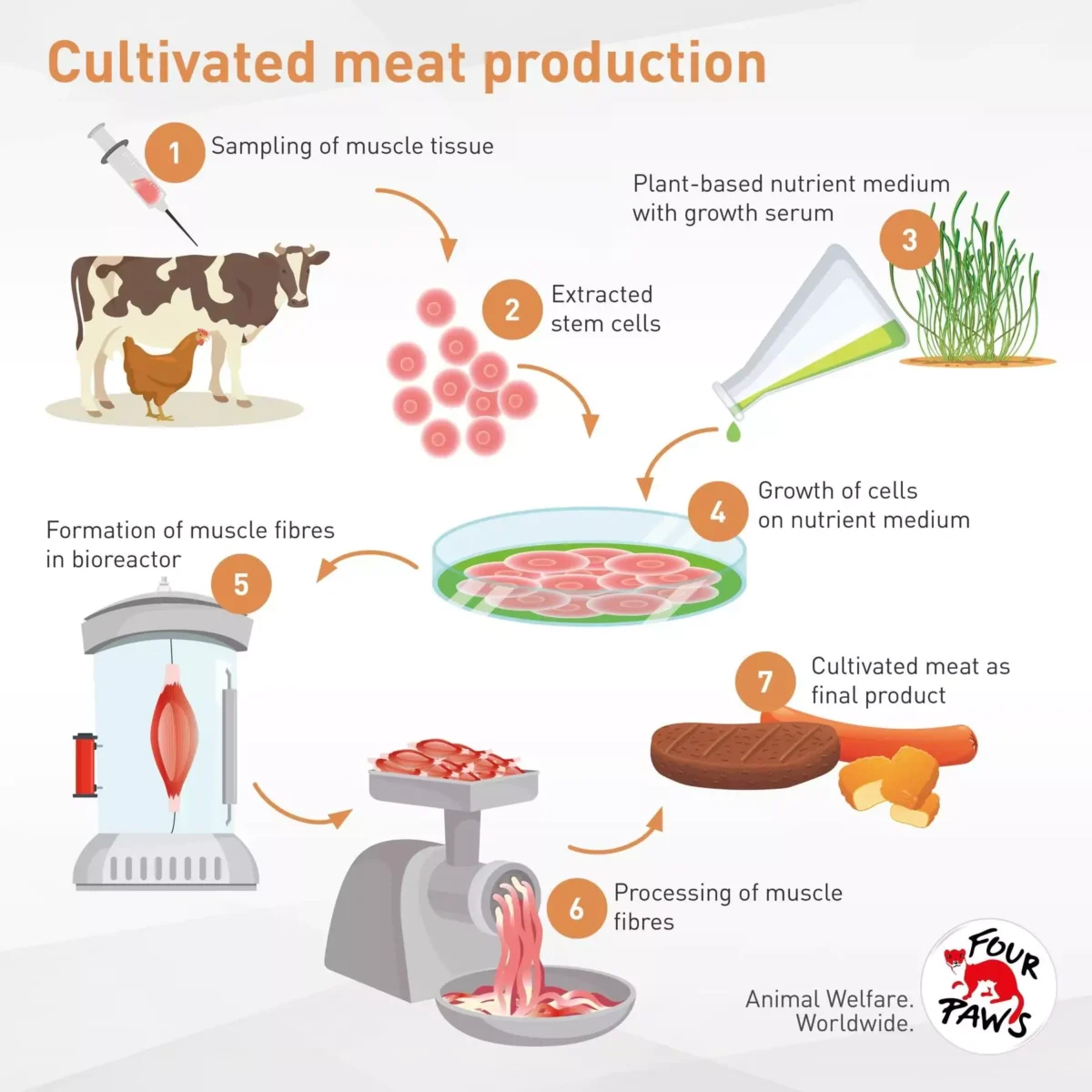The US government has given the green light for the sale of lab-grown meat to the public. UPSIDE Foods and GOOD Meat, two cultivated meat producers, have received approval from the Department of Agriculture (USDA) to start selling their lab-grown chicken products.
UPSIDE Foods celebrated the milestone on social media, emphasizing that this marks a historic moment. Lab-grown meat is produced in large tanks by manipulating animal cells.

Earlier this year, the US Food and Drug Administration (FDA) gave a favorable response to GOOD Meat’s lab-grown chicken, declaring it safe to eat. UPSIDE Foods received a similar approval in November 2022.

Proponents of lab-grown meat argue that it is a more ethical and environmentally friendly way to produce meat. It reduces harm to animals and minimizes the environmental impact associated with traditional meat production, which requires vast amounts of land and water.
Cell-cultivated Lab-Grown meat
Lab-grown meat is created by cultivating cells from living animals, such as fertilized eggs, which are then grown into meat. The end product is shaped and cut to resemble traditional meat products.

GOOD Meat proudly claims to be the first company globally to sell cultivated meat made from cells rather than from slaughtered animals.
While lab-grown meat production is more costly than traditional butchering, it offers a sustainable alternative. Initially, these products will not be available in retail stores but will be introduced at partnered restaurants.
This approval represents a significant step forward in the development of sustainable and ethical food sources for the future.”
Advantages of Lab-Grown Meat:
- Reduced Environmental Impact: Lab-grown meat production requires significantly fewer resources compared to traditional livestock farming. It uses less land, water, and produces fewer greenhouse gas emissions, which can help mitigate the environmental impact of food production.
- Animal Welfare: Lab-grown meat eliminates the need to raise and slaughter animals for meat, reducing animal suffering associated with conventional agriculture.
- Consistency and Safety: Lab-grown meat can be produced in a controlled environment, minimizing the risk of contamination and foodborne illnesses commonly associated with traditional meat production.
- Customization: Researchers can control the nutritional content and composition of lab-grown meat, potentially making it healthier by reducing unhealthy fats and adding beneficial nutrients.
- Land Conservation: As lab-grown meat requires less land, it can help reduce deforestation and land degradation, preserving natural habitats and biodiversity.
- Mitigating Antibiotic Use: Traditional livestock farming often involves the use of antibiotics, contributing to antibiotic resistance. Lab-grown meat production can be designed to be antibiotic-free.

Risks and Challenges of Lab-Grown Meat:
- Cost: Currently, lab-grown meat production is more expensive than traditional meat production. Reducing costs to make it competitive in the market remains a significant challenge.
- Consumer Acceptance: Some consumers may be hesitant to accept lab-grown meat due to concerns about its safety, taste, and naturalness. Overcoming these perceptions is crucial for its widespread adoption.
- Regulatory Approval: Lab-grown meat faces regulatory hurdles, and gaining approval from government agencies, like the FDA and USDA, can be a complex and lengthy process.
- Scale-Up Challenges: Producing lab-grown meat on a large scale is a technical challenge. Scaling up production to meet the demands of a growing population is a significant obstacle.
- Energy Use: The energy requirements for lab-grown meat production, particularly for maintaining optimal conditions in bioreactors, can be high and may rely on non-renewable energy sources.
- Cultural and Ethical Considerations: Lab-grown meat may face cultural and ethical objections from individuals who value traditional farming practices or have concerns about the manipulation of cells.
- Nutritional Value: Ensuring that lab-grown meat matches the nutritional profile of traditional meat, especially regarding essential nutrients like vitamins and minerals, is a challenge that must be addressed.
Conclusion
Lab-grown meat offers several potential advantages, particularly in terms of sustainability and animal welfare, but it also faces significant challenges related to cost, consumer acceptance, and regulatory hurdles. Continued research and innovation will be essential to address these issues and make lab-grown meat a viable and widely accepted food source.
Центр ментального здоровья — это пространство, где любой может найти поддержку и профессиональную консультацию.
Специалисты работают с разными запросами, включая стресс, усталость и психологический дискомфорт.
https://double-glazing-essex82698.blogerus.com/55256036/everything-about-marketing
В центре используются современные методы терапии, направленные на улучшение внутренней гармонии.
Здесь создана комфортная атмосфера для доверительного диалога. Цель центра — поддержать каждого клиента на пути к душевному равновесию.